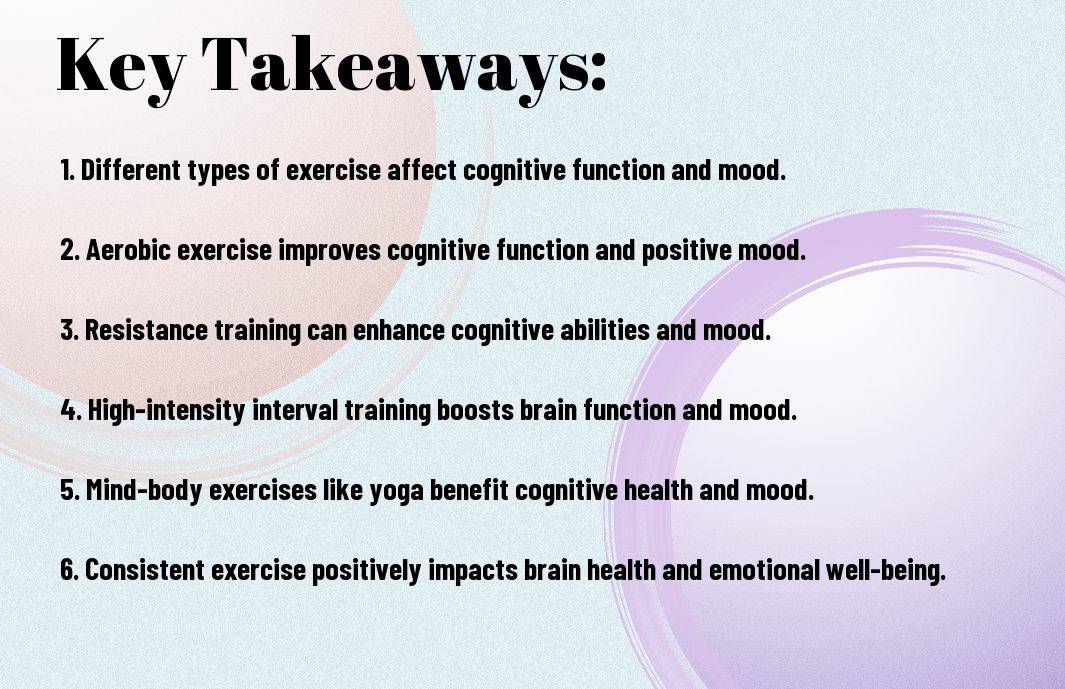
Newsletter Subscribe
Enter your email address below and subscribe to our newsletter

Enter your email address below and subscribe to our newsletter

Physical Exercise! You may already know the numerous physical benefits of engaging in regular exercise, but did you know that it can also have a significant impact on your cognitive function and mood? In this blog post, we will explore the different approaches to physical exercise that can help enhance your mental well-being and emotional state.


Exercise has a profound impact on the brain, with numerous neurobiological mechanisms at play. When we engage in physical activity, our heart pumps more oxygen and nutrients to the brain, stimulating the growth of new blood vessels. Additionally, exercise promotes the release of various hormones, such as endorphins and dopamine, which are known to improve mood and reduce stress. Furthermore, regular exercise has been linked to the production of proteins that support the growth, function, and survival of brain cells.
Exercise-induced neuroplasticity refers to the brain’s ability to reorganize and adapt in response to physical activity. This phenomenon involves the formation of new neural connections and the remodeling of existing ones. Research has shown that exercise can enhance cognitive function, learning, and memory by promoting neuroplasticity. Notably, aerobic exercise has been found to increase the volume of the hippocampus, a brain region crucial for memory and learning.
The brain’s ability to change and adapt in response to exercise is a remarkable process that underlies the cognitive benefits of physical activity. By engaging in regular exercise, individuals can support their brain health and potentially reduce the risk of neurodegenerative diseases such as Alzheimer’s. It is important to incorporate a variety of exercises, including cardiovascular activities, strength training, and coordination exercises, to harness the full potential of exercise-induced neuroplasticity.
Now, aerobic exercises are known to have a significant impact on cognitive health. Activities such as running, swimming, or cycling help increase oxygen flow to the brain, which can improve cognitive function, memory, and attention. Research has shown that regular aerobic exercise can also lead to the growth of new neurons in the brain, enhancing overall brain health.
For resistance training, lifting weights or working with resistance bands can also benefit cognitive health. This type of exercise helps improve executive function, which includes skills like decision-making, problem-solving, and multitasking. Resistance training has been linked to increased levels of brain-derived neurotrophic factor (BDNF), a protein that supports the growth of new neurons and helps protect existing ones.
The American College of Sports Medicine recommends including resistance training in a well-rounded exercise routine to support cognitive function and overall brain health. Incorporating exercises that challenge the muscles can provide both physical and mental benefits.
With mind-body exercises such as yoga, tai chi, and Pilates, the focus is on connecting movement with breath and promoting mindfulness. These exercises can help reduce stress, improve mood, and enhance cognitive function. Mind-body exercises have been shown to increase brain volume in areas associated with memory and decision-making, leading to improved cognitive abilities.
Exercises like yoga involve poses that require concentration and balance, stimulating the mind and body simultaneously. The combination of physical movement and mental focus can help strengthen neural connections and support overall cognitive health.
Exercises encompass High-Intensity Interval Training (HIIT) which involves short bursts of intense exercise followed by brief recovery periods. This type of workout can help boost cognitive function by increasing levels of neurotransmitters like dopamine and serotonin, which are important for mood regulation. HIIT has also been shown to improve cardiovascular health, which can have a positive impact on brain function.
Health professionals recommend incorporating a variety of exercise modalities into your routine to support cognitive health. Whether you prefer aerobic exercises, resistance training, mind-body exercises, or HIIT, each approach offers unique benefits for your brain and overall well-being.

One of the key benefits of physical exercise in children and adolescents is its positive impact on cognitive function. Research has shown that regular exercise can improve attention span, memory, and academic performance. Physical activity can also help in reducing symptoms of ADHD and boosting self-esteem in this age group. Encouraging children and adolescents to engage in sports, outdoor play, or structured exercise programs not only enhances their physical health but also contributes significantly to their cognitive development.
Across adulthood, engaging in regular exercise remains crucial for maintaining cognitive health. Physical activity has been linked to a reduced risk of cognitive decline and dementia in later life. Adults who participate in activities such as walking, cycling, or aerobic exercises show improvements in memory, reasoning skills, and overall cognitive function. It is never too late to start incorporating exercise into daily routines to reap the cognitive benefits.
Further, exercise promotes the release of chemicals in the brain that support the growth of new brain cells and improve overall brain function. This highlights the importance of staying physically active, not only for physical health but also for mental well-being in adulthood.
With advancing age, the risk of cognitive decline and neurodegenerative disorders such as Alzheimer’s disease increases. Regular physical exercise has been shown to be a powerful tool in delaying cognitive decline and reducing the risk of developing dementia. Activities like strength training, walking, and yoga can enhance cognitive function, memory, and attention in older adults. It is crucial for the elderly to adopt an active lifestyle to preserve cognitive health and maintain independence as they age.
Cognitive stimulation through exercise not only benefits the brain but also enhances overall quality of life in older adults. By incorporating regular physical activity into their routines, older individuals can experience improved brain function, mood, and social engagement, contributing to a healthier and more fulfilling aging process.
All too often, depression can feel like a heavy cloud looming over every aspect of life. However, numerous studies have shown that physical exercise can serve as a powerful tool in managing and even alleviating symptoms of depression. Exercise has been found to stimulate the production of endorphins, the body’s natural mood lifters, which can help combat feelings of sadness and hopelessness. Additionally, regular physical activity has been linked to a reduction in symptoms of depression, providing individuals with a proactive and empowering approach to managing their mental health.
The relationship between anxiety and physical activity is a complex one, but studies have consistently shown that engaging in regular exercise can significantly reduce symptoms of anxiety. Exercise acts as a natural stress reliever, helping to lower levels of the body’s stress hormones and providing a healthy outlet for pent-up energy and tension. Furthermore, physical activity can increase the production of neurotransmitters like serotonin and norepinephrine, which play key roles in regulating mood and anxiety levels.
With this in mind, it’s clear that incorporating regular exercise into your routine can have far-reaching benefits beyond just physical health. Whether it’s through aerobic activities like running or cycling, or more calming practices like yoga and Pilates, finding a form of exercise that resonates with you can be a game-changer in managing anxiety and improving overall mental well-being.
This subsection probes into the significant role that exercise plays in managing stress levels and promoting mental resilience. Physical activity can help to flush out the cortisol, a hormone released in response to stress, and counteract its negative effects on the body. Regular exercise has also been shown to improve sleep quality, further enhancing the body’s ability to recover from daily stressors and maintain a healthy mental state.
Many individuals often overlook the importance of tailoring their exercise routines to their unique needs and capabilities. Personalized exercise programs take into account factors such as age, fitness level, health conditions, and personal goals. It is crucial to consult with a fitness professional or healthcare provider to design a program that is safe and effective for you.
To ensure long-term adherence to an exercise program, psychological aspects must be considered. Motivation, goal-setting, and social support play crucial roles in maintaining consistency. Positive reinforcement and setting achievable goals can help individuals stay committed to their exercise routines.
On top of that, individual preferences and interests should be taken into account when designing an exercise program. Enjoying the activities can increase adherence and make the experience more rewarding. Incorporating variety and exploring different types of exercise can make the process more engaging and help prevent boredom.
Despite the emphasis on physical exercise for cognitive function and mood enhancement, the role of nutrition should not be overlooked. A well-balanced diet is crucial not only for overall health but also for optimizing brain function and mood regulation.
The foods we consume play a significant role in determining our cognitive function. A diet rich in fruits, vegetables, whole grains, and lean proteins provides imperative nutrients that support brain health. Omega-3 fatty acids, found in fatty fish like salmon and walnuts, are especially beneficial for cognitive function. Moreover, staying hydrated and avoiding excessive consumption of sugar and processed foods can help maintain focus and mental clarity.
For individuals looking to further enhance cognitive function in conjunction with exercise, certain supplements can be beneficial. Supplements such as fish oil, vitamin D, and B vitamins have been shown to support brain health and cognitive function when combined with regular physical activity. It is imperative to consult with a healthcare provider before starting any supplement regimen to ensure safety and effectiveness.
Understanding the relationship between nutrition, supplements, and exercise is key to optimizing cognitive function and mood. By incorporating a balanced diet, strategic supplementation, and regular physical activity into one’s lifestyle, individuals can support their brain health and overall well-being.

For many individuals, committing to a regular exercise routine can be challenging due to various barriers. Some common obstacles include lack of time, low motivation, feeling overwhelmed, physical limitations, and financial constraints. It is crucial to identify these barriers and address them proactively to ensure consistency in physical activity.
The key to overcoming barriers to exercise lies in motivation and behavioral change. By setting realistic goals, creating a supportive environment, and establishing a routine, individuals can increase their likelihood of adhering to an exercise program. Implementing strategies such as finding an exercise buddy, tracking progress, and rewarding oneself for achievements can also help maintain motivation and sustain long-term behavior change.
Common motivational strategies include visualizing success, focusing on the benefits of exercise, and using positive self-talk to overcome negative thoughts and emotions.
Hence, incorporating physical exercise into our routine not only improves our physical health but also enhances cognitive function and mood. Whether it’s engaging in aerobic exercises, strength training, yoga, or simply taking a brisk walk, research has shown that regular physical activity has profound effects on our brain health. A neuroscientist shares the 4 brain-changing benefits of exercise, shedding light on how physical exercise can boost memory, cognition, mood, and overall brain health source.
A: Physical exercise has been shown to enhance cognitive function by promoting neuroplasticity, improving blood flow to the brain, and reducing inflammation, all of which can benefit memory, attention, and decision-making abilities.
A: Physical exercise stimulates the production of endorphins and other neurotransmitters that can improve mood, reduce feelings of anxiety and depression, and increase overall feelings of well-being.
A: Aerobic exercises like running, swimming, and cycling have been found to have the most significant impact on cognitive function, but activities that include coordination, balance, and strength training can also be beneficial.
A: Research suggests that engaging in at least 150 minutes of moderate-intensity exercise per week can improve cognitive function, but even smaller amounts of exercise can have positive effects.
A: Yes, physical exercise can help reduce stress and anxiety by releasing endorphins, improving sleep quality, and providing a distraction from negative thoughts and worries.
A: Engaging in activities that require both physical movement and cognitive engagement, such as dancing, martial arts, and yoga, can help boost creativity and problem-solving skills by activating different parts of the brain.
A: While any time of day is beneficial for exercise, some research suggests that exercising in the morning may have additional cognitive benefits, such as improved focus and attention throughout the day.
The One Thing – Gary Keller and Jay Papasan’s Focus on Making Everything Else Easier
Reduce Digital Distractions with Cal Newport’s Strategy- Digital Minimalism
Eisenhower Matrix – Dwight D. Eisenhower’s Strategy to Prioritize Tasks by Urgency and Importance
Study Routines Transformed: Unleash Atomic Habits for Students to Boost Your Studies